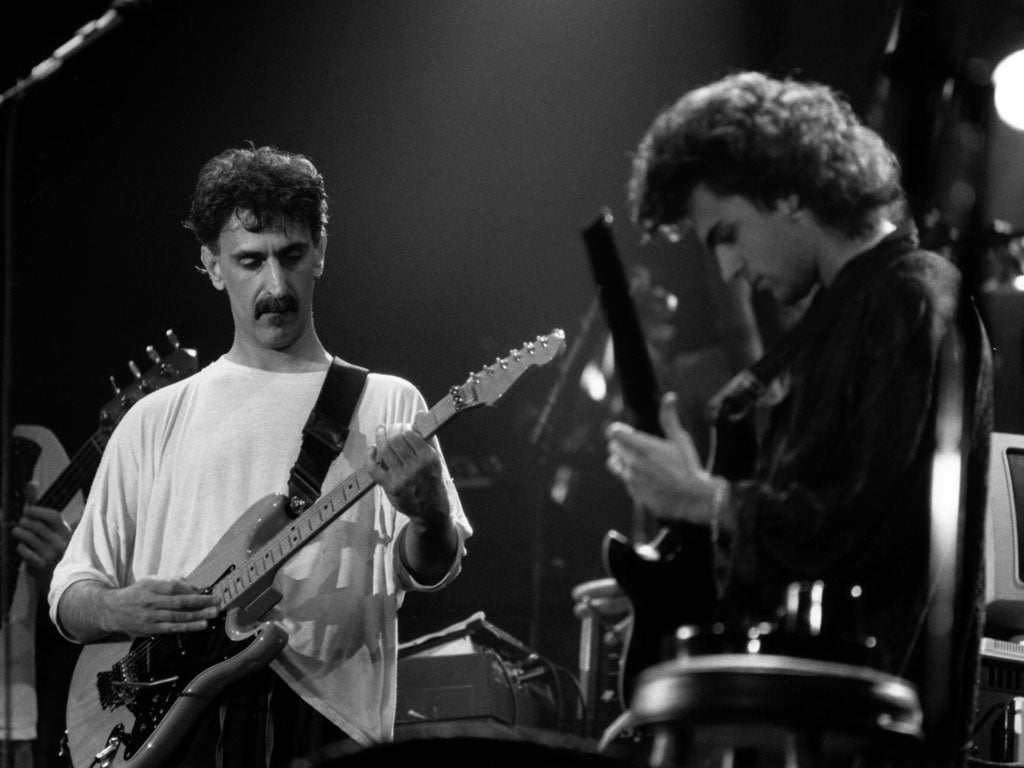It's a family affair: When great musicians' kids follow in their fathers' famous footsteps
From Frank Zappa’s son to the Waterson folk dynasty, music runs in the blood – and the new generation are living up to their famous names

You hear a lot these days about the progeny of rock stars following in their parents’ footsteps with varying degrees of success. Whether they pursue a similar aesthetic, as with Paul Simon’s singer/songwriter son Harper, or head off in pastures new – like Sting’s daughter performing as electro-pop act I Blame Coco, it usually appears to be a thankless task.
Regularly unable to match their parents’ achievements despite early exposure thanks to a familiar name, they suffer the weight of expectation alongside suspicion that they are having an easy ride on their forebearers’ coat-tails. Increasingly, an attractive alternative for offspring with musical ambition is to take on the responsibility of carrying the torch for their mothers’ or fathers’ legacies. You find this with Frank Zappa’s son Dweezil, Arthur Jeffes, son of Penguin Café Orchestra founder Simon, and, arguably, Lal Waterson’s daughter Marry.
At first glance, this last example might appear more natural as the Watersons are a folk dynasty, so Marry lives in a genre where carrying on tradition is a fundamental prerequisite. As with country, the whole point is to pass on the flame through the generations. Rosanne Cash, Johnny’s eldest daughter, continues to play country, albeit in a more melodic style than her father, while Hank Williams III has combined a career in punk bands with honky-tonk tributes to his legendary granddad.
Marry, though, has had an even more important relationship with her mother’s oeuvre. For when the Watersons disbanded in the early Seventies, Lal developed as a talented, Rimbaud-influenced writer of original material, annoying the folk fraternity and missing out on crossover success. Her reputation partly rests on the currently unavailable Bright Phoebus, a collaboration with brother Mike, released in 1972 in limited form and unavailable since the mid-Eighties. Lal died of cancer in 1998, with her brother passing away two years ago, and only recently has Marry been able to revisit her mum’s work.
Last autumn she organised a tribute tour for Bright Phoebus that featured turns from Jarvis Cocker and Richard Hawley. Marry has also helped collate a book Teach Me to Be a Summer’s Morning that features Lal’s paintings, drawings, stained glass designs, poems and lyrics, along with a disc of home demos. Yet while Bright Phoebus for now remains a great lost album, Lal is still respected by younger artists from Arcade Fire to King Creosote. Unlike Frank Zappa, who boasts a mammoth discography, but since his own untimely demise in 1993 has rarely been namechecked by contemporary musicians.
Enter son Dweezil to fill the vacuum: a former MTV VJ, actor and jobbing guitarist, who, under the Zappa Plays Zappa banner, has been touring the US and Europe since 2006 with his own band to remind fans of his dad’s singular musicality. Performing at venues as large as Liverpool’s Philharmonic and Glasgow’s Royal Concert Hall suggests this is far from a niche activity.
Indeed, with an evolving setlist, as Dweezil delves deeper into his father’s back catalogue, he is on a journey that endears him all the more to true believers, along with pre-gig music bootcamps where he passes on his own autodidactic lessons.
Another idiosyncratic musician, albeit with a smaller profile, is Britain’s own Simon Jeffes, the composer who founded the Penguin Cafe Orchestra. The group formed in the Seventies and are best known for the deathless instrumental and film soundtrack staple “Music for a Found Harmonium”.
Its immediately engaging, repetitive melody gives a sense of Jeffes’s ambition to play sonic games in an accessible way. Although ahead of its time in allusions to minimalism and what became world music, the Orchestra’s later recordings were more coffee table than visionary, though the death of its core performer in 1997 from a brain tumour was still a premature loss.
It was a brave move, then, for his son Arthur to pick up the baton in 2011 and start up Penguin Cafe, a re-imagining of Simon’s original ensemble. Rather than simply playing old material with his dad’s former compadres, Arthur has brought together his own disparate group that has included the likes of Suede’s Neil Codling. They have focused on new compositions in familiar styles, first on warmly received debut album, A Matter of Life, with follow-up, The Red Book, due for release next month. Arthur admits that his father’s legacy continues to closely inspire his own work.
“The first album, I think, was about establishing our own sound and identity, dusting out and reopening the Cafe, so to speak,” he says. “But with The Red Book I think this is a grand new departure and ambition to sonically chart an imagined journey through the world.”
It is certainly a far-reaching trip, taking in Mexican guitar styles on “Black Hibiscus” and African zither on “Bluejay”. Penguin Cafe take the imaginary folklore motif of the group’s first incarnation and runs with it into new spaces, continuing Simon’s vision in an original way. Dad would be proud.
Penguin Cafe’s ‘The Red Book’ is out on 17 February on Editions Penguin Cafe
Join our commenting forum
Join thought-provoking conversations, follow other Independent readers and see their replies
Comments
Bookmark popover
Removed from bookmarks